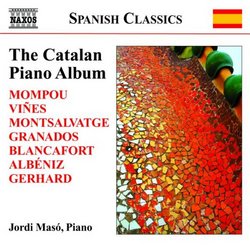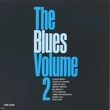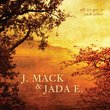| All Artists: Federico Mompou, Ricardo Viñes, Josep Maria Ruera, Xavier Montsalvatge, Enrique Granados, Joaquin Maria Nin-Culmell, Joan Massia, Manuel Blancafort, Isaac Albeniz, Joaquin Malats, Ricardo Lamote de Grignon y Ribas, Joaquin Serra, Enrique Morera, Roberto Gerhard, Agusti Grau, Xavier Gols, Joaquim Zamacois, Jordi Masó Title: The Catalan Piano Album Members Wishing: 0 Total Copies: 0 Label: NAXOS SPANISH Release Date: 10/30/2007 Genre: Classical Styles: Chamber Music, Historical Periods, Classical (c.1770-1830), Instruments, Strings Number of Discs: 1 SwapaCD Credits: 1 UPC: 747313045778 |
Search - Federico Mompou, Ricardo Viñes, Josep Maria Ruera :: The Catalan Piano Album
 | Federico Mompou, Ricardo Viñes, Josep Maria Ruera The Catalan Piano Album Genre: Classical |
Larger Image |
CD DetailsSimilar CDs
|
CD ReviewsBonbons from Barcelona J Scott Morrison | Middlebury VT, USA | 11/10/2007 (5 out of 5 stars) "Is there anyone who doesn't like Spanish piano music of the last century? No, I thought not. There is something so fresh and smile-inducing about the piano works of Albéniz and Granádos and their brethren. And of Spain's composers none are more deeply cultured and abundantly talented than those from Catalonia. Catalan pianist Jordi Masó, who has already given us treasurable recordings devoted to music by Mompou, Turina, Soler, Homs and others, is back with a cross-section of piano miniatures from that northeastern corner of Spain centered on the great city of Barcelona. Little of the music here is familiar to the casual music-lover outside Spain but all of it is worth hearing. The composers on this disc include Federico Mompou, Ricardo Viñes, Xavier Montsalvatge, Enrique Granados, Josip María Ruera, Joaquim Nin-Culmell, Joan Massià, Isaac Albéniz, Joaquim Malats, Ricard Lamote de Grignon, Joaquim Serra, Enric Morera, Robert Gerhard, Agustí Grau, Xavier Gols, and Joaquim Zamacóis. None of these pieces is longer than eight minutes and some are barely a minute long. All are drenched in Spanish color, even those whose compositional techniques include influences from Debussy, Ravel, Milhaud, Scriabin and Stravinsky. Particularly appealing are the three miniatures by Nin-Culmell (who was, as some may know, the brother of the erotic diarist Anaïs Nin) with their insouciant and ironic tone. Manuel Blancafort's 'Polka de l'equilibrista' ('Tightrope-walker's Polka') has some of the same flavor. Mompou's Canço i Dansa No. 13, originally for guitar, has been faithfully transcribed for piano by Masó and sounds for all the world like Mompou's more familiar songs and dances written for piano. Ricardo Viñes was known primarily as a piano virtuoso, having given premieres of music by such worthies as Ravel, Debussy, Satie, Turina and Granados, and he wrote little music, but the two pieces included here -- 'En Verlaine mineur (à la mémoire de Gabriel Fauré)' and 'Menuet spectral (à la mémoire de Maurice Ravel)' -- are little gems. Strumming guitar sounds figure in many of these pieces but none more so than in Malats's 'Serenate española', a whirling festival of a piece. Roberto Gerhard is represented by two early miniatures called 'Sketches' and they are among the pieces he submitted to Schoenberg when asking to study with him; they sound, though, like the work of a Catalan Scriabin. The sardana, a circle dance considered the national dance of Catalonia, figures in several of the works, none more inviting than Zamacóis's eight-minute 'Sardana', which is virtuosic and overflowing with high spirits, a real tour-de-force played brilliantly by Masó. This is a well-recorded, well-played CD filled to the brim -- 79 minutes worth -- with wonderful music. It is hard to imagine anyone disliking it. Scott Morrison" A Great Collection of Early 20th Century Catalan Music Luis Miguel Muelle | Roswell, GA United States | 03/27/2009 (4 out of 5 stars) "I really like this CD. I confess that I did not know what to expect, as I am not familiar with the wider field of Catalan composers beyond Albéniz and Granados. Of the composers included in this recording, however, I only had a vague acquaintance with the names of Mompou and Montsalvatge. The CD was a wonderful surprise.
I'll begin with the pianist, Jordi Masó. He sounds relaxed and plays with a light touch, but he also has the range of depth to express drama and emotion, without straining or reaching beyond the music. His pacing always seems appropriate to the music, never indulging in idiosyncrasies or extremes. A Catalan himself, he studied in Barcelona as well as in the Royal Academy of Music in London, earning the prestigious DipRAM. Masó arranged some pieces for piano, wrote the very informative liner notes, and it seems to me that he also made the selection of the music. In his notes he writes that the first decades of the twentieth century was a particularly fertile and stimulating period for Catalan piano music, with enormous stylistic diversity, with links to the Romantic tradition of Chopin, Schumann and Liszt, the use of nationalistic and folk themes, a growing admiration for Wagner, an affinity with the burgeoning and distinctive French music primarily of Debussy and Ravel, and I would add an opening up to the musical language of neo-classicism as well. At first I was listening for these influences, but soon I realized that I was in a sound world that eschewed preconceptions and insisted on being heard on its own merits. That sound-world is immediately established by the dreamy and melodic initial piece, Mompou's Cançó I Dansa No.13. Vaguely impressionistic, it presents what appears to be a nostalgic reminiscence, and then breaks into, as the name implies, a slightly ironic little dance. Along the same vein is Viñes's En Verlaine Mineur. Harmonic, yet slightly dissonant, there's a tenuously comfortable melody that seems to hesitate it's way through the piece. A complete change of pace, Ruera's Tocs de Festa, Festival Fanfares, sounds like part neo-classical ballet and part march. Insistent rhythms are broken up by persistent forward motion in a very entertaining and rollicking piece. No sooner have we gotten into the festive spirit than we languidly fall back into Xavier Montsalvatge's Divertimento No.2. A dreamy warm afternoon Habanera dance piece which starts quite simply and melodic, becomes whimsically discordant, and then finds its way back to the simplicity of its beginning, but with a sadder tone. Beautiful. The next piece is a Mazurka of Granados. Sad and nostalgic in its minor key, at first it's hard to identify its origins, but then it declares its Iberian blood in its flourishes, with a persistent closing phrase that seems to silence all further speculation, especially when in its last apparition it ends in a satisfying major chord. From the tropical ease of the Habanera and the nostalgic repose of the Mazurka, we jump into a playful and humorous, almost cartoon-like, world with Joaquim Nin-Culmell's 3 Tonadas. I kept imagining children's animated cartoons, especially in the first "tonada", more because of the attitude than the music itself. It is not surprising that Nin-Clmell studied with Alfred Cortot and Paul Dukas! The second tune starts off a lot like Smokey Robinson & The Miracles' "The Tears of a Clown", which seems appropriate -- or ironic, as this is a very funny little piece, especially the hilarious ending. Apparently he wrote 48 "tonadas", and it would be interesting to hear them all, even if it may be too much of a good thing. Again there is a change of mood when we hear Joan Massià's El Gorg Negre, The Black Lake. Late Romantic and pictorial, this is a beautiful salon piece. We are again thrown into a whimsical world by the Polka De L'Equilibrista, the tightrope walker. The piece is unremarkable but certainly fun enough. Then comes Albéniz's very Spanish barcarolle, Mallorca. In Masós hands this is an icon of elegance and restraint. And speaking of elegance, while still in the very Spanish music world created by Albéniz, Joaquim Malats's Serenata Española is beautifully played and the rhythmic and melodic nuances seem to float off the keyboard. Malats was a popular virtuoso, and Albéniz actually wrote his popular suite Iberia specifically for him. One can sense the connection between these two artists, especially hearing these two pieces in sequence. Some listeners will be familiar with this serenade in its guitar version. Ricard Lamote De Grignon's El Convent dels Peixos, The Convent of the Fish, is a dreamy, somewhat Satie-like poem, a clear little gem. In the same vein is Ricardo Viñes's Menuet Spectral, although it is not a miniature and has a more sophisticated form and development. Joan Massiá's Scherzo is a true scherzo, changeable and humorous. Serra's Cançó De Bressol, which means "Lullaby", is sunny and reflective. Morera's Dansa No. 1 breaks the sleepy mood with an inventive and rhythmic composition, full of many rich and gorgeous sounds. Roberto Gerhart's 2 Apunts, which can be translated as notes or sketches, are more firmly planted in a 20th century soundscape. They are ethereal and searching and as modern as they sound they are never dissonant. Then follows a world premiere recording of a barcarolle by Agustí Grau, Tamarit. It starts off simply but goes through many ebbs and flows, even quoting Mozarabic melodies in its central section, before gently coming ashore. Xavier Gols's Ametllers Florits, Al Lluny, Blossoming Almond Trees in the Distance, is another piece that seems to float, perhaps alluding to the optical illusion of distance, painting a decidedly impressionistic landscape. The "Sardana" is a circle dance typical of Catalunya. The penultimate selection on this CD is a sardana composed by Joaquim Zamacóis. In his hands it becomes variations on a theme, going through many colors and lightings of the basic tune. The CD began with Frederic Mompou, and it ends with his Preludi No.12. This is a good piece with which to leave the listener, as it characterizes much of what makes this a great CD. It combines melodic with impressionistic, earthy with ethereal, and has a dreamy quality shared by many other pieces, yet sounds unique and secure in its personal voice. Masó brings full circle what he started with Cançó I Dansa No.13, which leaves one sated and satisfied." |




